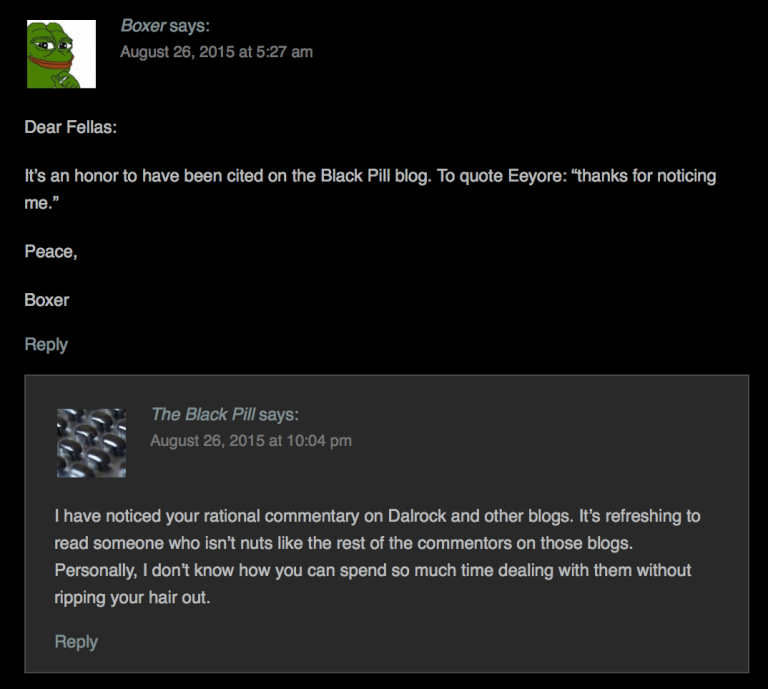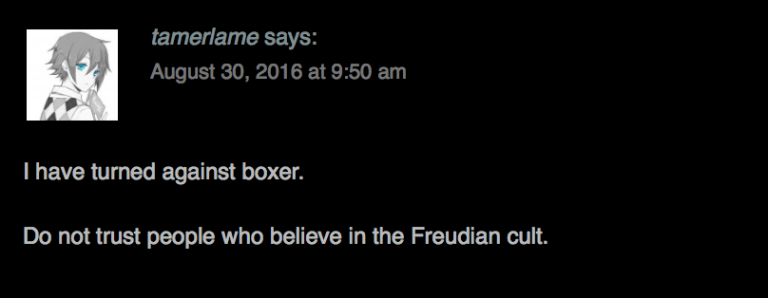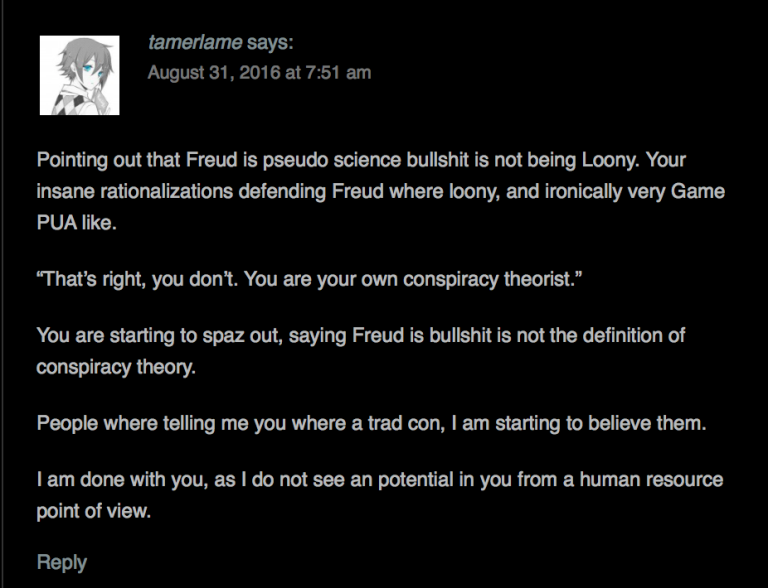While the internet has allowed for the existence of new social pathways, evidence mounts that it has also inflated the potential for dysfunction. Studies and popular articles suggest marked differences in the behavior of human subjects online, compared to behavior in traditional social interaction.
We’ve all probably known someone like Tamerlame, a self-described “manosphere content creator”. I’ll put up a link to his work (it’s objectively pretty good from a technical standpoint) if he gives me permission. I doubt he will, because he seems to be very upset at me presently.
Tamerlame is a regular commenter on Omega Virgin Revolt. Also known as Black Pill, the site’s content regularly criticizes both mainstream narratives and manosphere alternatives. As such, it provides a useful service to free-thinkers and is a bulwark against the sorts of echo chambers I enjoy scoffing at. Tamerlame seemed to become enamored with Brother Boxer after y’r humble narrator was featured on Black Pill, about a year ago.

I always try to be gracious and I enjoy talking to new people, so I gave Tamerlame my email address. He subsequently added me to a google plus group, and sent me regular (fawning) emails, inviting me to facetime with him (both personally, and as part of a larger group of manosphere critics). I always declined these invitations politely. It is flattering, of course, to be held in high esteem by strangers, but I didn’t know what sort of commitment these people wanted, and my time is valuable.
Fast forward to the present day. Brother Boxer decided to pop into Black Pill and leave a comment.

While Freud does not appear to be mentioned in Black Pill’s rules, quoting Uncle Sig is apparently against Tamerlame’s rules of internet association.

This is incredibly odd behavior, and it didn’t stop there.

I did pen a quick response to Tamerlame, which was unusually rude, but necessary.

One can read the rest of these exchanges here and here. The original articles are worth reading also.
In the context of an online interaction, what does such behavior suggest? I would argue that not only is Tamerlame a lonely person, but he also fears loneliness. Despite never having met Brother Boxer, he feels betrayed when the object of his affections disagrees with him online. Despite never having spoken to Boxer, he feels that Boxer is a trusted friend who has abandoned him.
The fear of being abandoned by a friend is a reasonable fear, rooted in the childhood fear of abandonment; but, it’s only reasonable when it corresponds to the reality of the definition.
People tend to have very few friends, and the people who qualify as friends are the same people that one interacts with, on the regular, face to face. This is the first thing that Tamerlame ought to absorb.
No one that I meet online is my friend. At best, they’re people to bounce ideas off of. My friends appear in my everyday life, physically. They’re the people who have helped me move house. They’re the people I go to dinner with. They’re folks who are welcome to personally stop by my humble abode, all unannounced, at two a.m..
That’s rough, but that’s reality.
The internet isn’t a place for friends. It’s a place for ideas. The internet is a place where people argue. You’re supposed to argue with people on the internet. If you’re doing it right, the people with whom you argue are teaching you something.
If you feel slighted because some stranger disagreed with you on the internet, then your energies are being massively misplaced. That’s another ugly truth. Thank me later, Tamerlame.
So what can we do to help folks like this? It’s difficult, but resources are available. Fortunately, a discussion of loneliness, and the fear of it, is extant in Sigmund Freud’s work. Tamerlame, and those like him, will be helped by a more thorough study of the topic, but the master is always a good place to start.
In his lectures on anxiety, 1916-1917, [in Introductory Lectures on Psychoanalysis (London: WW Norton, 1989)] we meet a little boy who is consumed with night terrors. He is afraid of the dark “except when [his] auntie speaks to [him]” … The subject went on to explain that when his auntie spoke, the room “got lighter” (398.)
The Dr. extrapolates this fear of loneliness to reliving of the trauma of separation from the original object of affection: the mother. People with such mother issues often never get over this existential terror. This is recast in adult life as the angst, related to what Heidegger called being-toward-death, and what Sartre called Nausea. It is the knowledge that one is individuated, which carries the seed of the knowledge that one’s time on earth is finite.
Ironically, this sort of anxiety leads a well-grounded person toward meaningful change and independence. At the same time, it tends to lead a man with (what we might call) mother issues toward an increased fear of abandonment and loneliness. Such a person enters into a neurotic state, feeling terrified of any form of abandonment, and never seeing himself as a separate, unique, worthwhile person.
Liran Razinsky [in Freud, Psychoanalysis and Death (New York: Cambridge, 2013)] explains:
“As anxiety proceeds, realistic anxiety falls out of view, becomes negligible, neuroticized… and its essence is deemed a repetition of an earlier form of anxiety. Finally, it loses its realistic aspect, its primacy in face of the situation (it is not a “natural response”) and becomes, in the discussion, completely neurotic” (106.)
The internet, useful for most things, is not really a sufficient substitute for healthy social interaction. People tend to become much more emotional online, and as such, the social bonds (if they even exist) that are formed there are much more fragile. Moreover, as the online world provides a simulacrum of social interaction, the people who tend to spend the most time online are the least socially adept, which creates a strange sort of infinite feedback loop
So what can a man like Tamerlame do to change his situation? The first (and perhaps most obvious) answer is to turn off the computer and reconnect with the actual world. Every community college in America provides free (or nearly free) courses in all manner of interesting disciplines, through which a fella can meet other people. Taking ballroom dancing or public speaking will ground a man in more a more healthy social praxis; but, really, anything in meatspace is good.
The fear of loneliness is a natural fear that is usually overcome in childhood, though it is often conquered later. Once one accepts himself, being alone is no longer frightening. Brother Boxer has been alone most of the day. Tonight, he will go out and eat dinner at a restaurant, probably with a friend, but maybe not. If he wants, he will have sex with someone. He will surely go back home, to his sanctuary on the fourth floor, where he will end the day in peace, without a nagging woman to bother him. There is nothing frightening about this. A man’s life as a bachelor is the most wonderful life (and I’ve had live-in girlfriends before, and have many married friends, and I know whereof I speak.) It’s the life I wish for all my brothers, online or off, whether or not they agree with me about 20th century psychoanalysis.
That site you linked to is frightening. It seems like a bunch of guys on their way to becoming George Sodini.
“V5K2C2”? Jesus humping Fuck, how the hell is anyone supposed to remember that, Boxer?
Now “Sovietmen.” There’s a damn site name you can relish.
Then again my “qedbook.wordpress.com” is pretty obscure too. But *grinning in RL* it doesn’t compare to the obscurity of V5K2C2. Yours sounds like a chemical weapons formula in an American research facility.
(“Research scientist strolls over: “Hey, what’s that? Oh mi God, it’s V5K2C2, I got it all over my arm! It’s burning, it’s burning!”
*grinning*
Anyway, come visit my site. You seem interesting enough to engrave K5V2C2 in my head again. I won’t ask what it means. It’s probably the password that opens up the giant doors to NORAD mountain, where you work. ~ Greg Nikolic (CEO Nikolic, qedbook.wordpress.com)